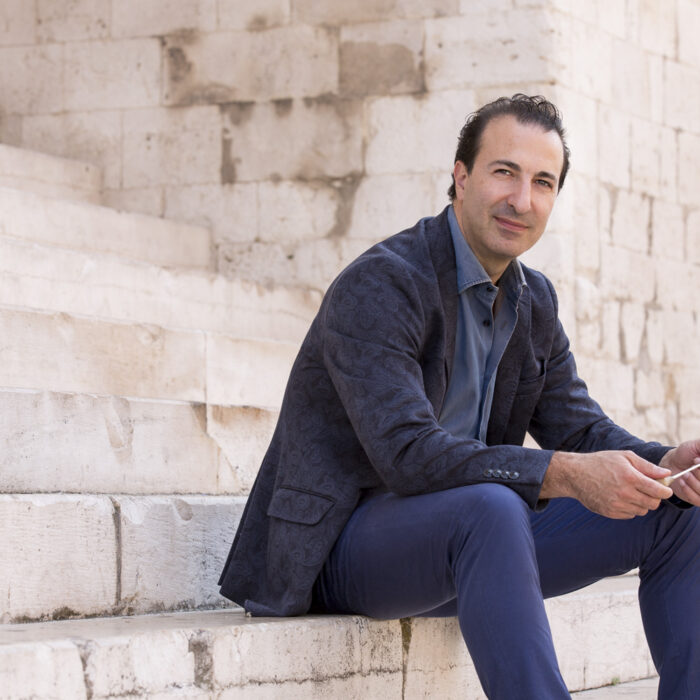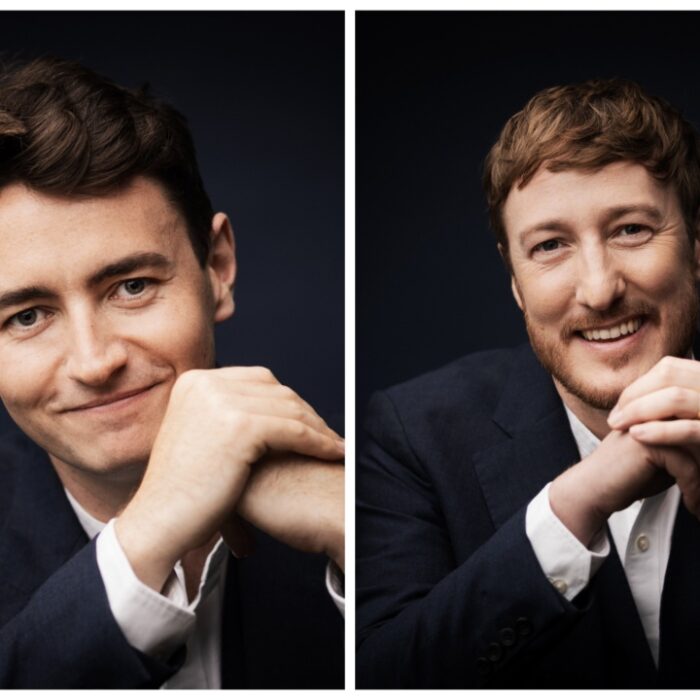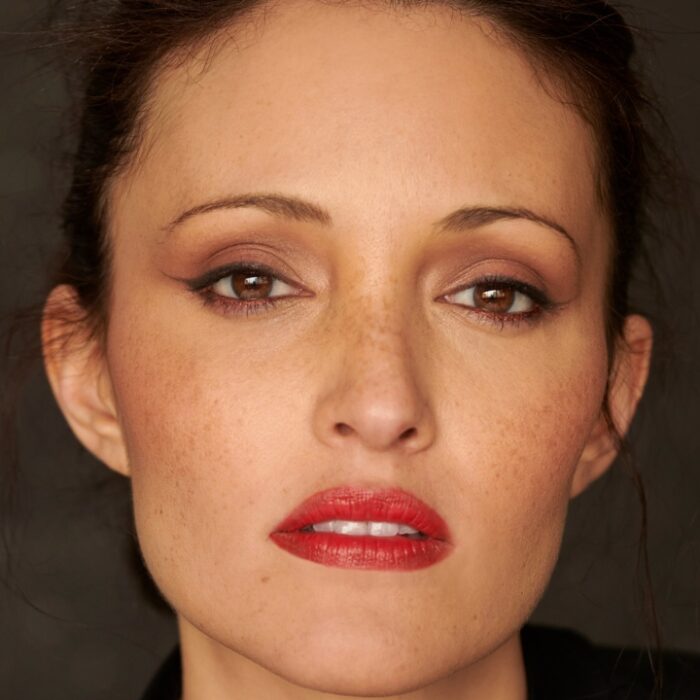
Q & A: Riccardo Frizza on COVID-19, Donizetti Festival & the Importance of Art
By Francisco Salazar(Credit: Gianfranco Rota)
For years, audiences who wanted to get a taste of Donizetti’s rarest works presented in a manner of utmost care at the Donizetti Opera Festival had to make the pilgrimage to Bergamo, the composer’s birthplace.
But COVID-19 has forced the event to take place via virtual means in 2020. As a result, audiences worldwide will get a chance to check out this unique experience.
Maestro Riccardo Frizza, the event’s Music Director recently spoke to OperaWire about COVID-19, Donizetti, the importance of art, and “Belisario” and “Marino Faliero,” the two operas he will be conducting at this year’s festival.
OperaWire: First of all, how have you been during this difficult time in our industry?
Riccardo Frizza: It is a very difficult time for freelance musicians and artists. I am afraid that many of us will give up this type of work to try out other careers, especially those who do not have many engagements in Europe, where seasons are currently starting, although with a lot of difficulties.
In the United States, the situation is extremely complicated. We have read the news about the Metropolitan Opera in New York, which has canceled its entire 2020-21 season, and we do not know what other theaters may do. There are thousands of artists with no way of earning money.
OW: You returned to work in the summer. What message would you send to theaters that have not opened? What did Italy do well at the beginning before its second closure?
RF: Returning to the theater felt like going back to school after the summer holidays. Very tense, with a great desire to make music.
In the beginning, it wasn’t at all easy; it seemed to me that I had lost all the confidence that I had before the pandemic, but after a few minutes I got it back again. I hope that theaters find the way to reopen again, following the safety regulations as an absolute priority, but at the same time giving artists the possibility to appear on stage. We need it. We live from our art.
OW: You recently opened the Teatro la Fenice. What precautions and safety measures did that organization take?
RF: It was a very positive experience. From the beginning of the season until the Italian government’s recent decision to close theaters due to the pandemic, it has been proven that operas can be performed on stage whilst maintaining a safe distance between the actors and the musicians, and allowing audiences to enjoy the spectacle, even in the current situation. Now we are waiting for venues to be gradually allowed to resume their activity. Of course, this entire situation has forced us to redesign the Donizetti Festival to enable us to put it on despite all the difficulties.
OW: Speaking of Donizetti, you conducted the Requiem and “Roberto Devereux” a few months back. After months of absence from the stage, what did you learn from these two experiences?
RF: Donizetti’s “Requiem,” which we performed at the cemetery in Bergamo, in the same place which became famous for the trucks transporting the COVID fatalities, was certainly a discovery for many people. Thanks to RAI TV we were able to do a live broadcast of the concert in homage to the dead, and those who watched and listened have discovered a sublime piece by Donizetti which is not well known because it is not one of his operas. I think that, like Verdi’s mass, it should be performed more often because it is very intense and inspiring.
With regard to “Roberto Devereux,” it is certainly one of Donizetti’s most important operas and it had not been performed in Venice since 1972, with Caballé. It has been a very significant event for La Fenice and audiences enjoyed Donizetti’s music, which we treated comprehensively. On this occasion, I noticed that Donizetti is a better dramaturg than people usually think. The modernity of the scenes is perhaps even more interesting than Verdi at his best.
OW: Tell me about the staging for this production and what were you able to do musically with this “Roberto Devereux?”
RF: Alfonso Antoniozzi’s directing was amazing. He is a great artist and man of the theater and he managed to bring his concept of the relationships between the characters to center stage, with well-crafted movements which, although made at a distance, were very striking. In “Roberto Devereux,” the distance of the feelings between the characters was underlined by the physical distance that we had to keep, making the drama more powerful.
OW: Of the three Tudor queens, “Roberto Devereux” is considered the masterpiece and the one that is most developed. What is your opinion and what is your favorite moment in this opera?
OW: I agree that “Roberto” is the most developed opera, although I have to say that “Maria Stuarda” is also a very different opera from “Anna Bolena,” and quite experimental in its way. The part that I find most striking is the confrontation between Sara and Nottingham. I always compare it to the Otello and Desdemona scene. The tension between the couple is developed masterfully and with simple yet very effective orchestral writing.
OW: After months of changes, the Donizetti Opera has been reshaped for virtual streams. Bergamo was one of the most affected cities in Italy during the first wave of COVID-19. Tell me about performing these works for a virtual audience?
RF: As I said before, at the Donizetti Festival, and due to the recent restrictions and closure of theaters in the whole of Italy until further notice, we have decided to forge ahead and adapt ourselves to the situation at hand. As well as modifying the programming, we are giving the performances with no audience and streaming them through the festival’s Donizetti WebTV and on Rai5. In spite of all the difficulties, and that we will miss the warmth of the audiences, we are very excited. The only thing we can do is reinvent ourselves. Both audiences and artists deserve it.
With regard to the programming, “Marino Faliero,” with the Ricci/Forte creative project will be broadcast on the Web TV and also live on Rai 5, opening the festival on Nov. 20. “Belisario” (in concert format) and “Le nozze in villa” (conducted by Stefano Montanari and directed by Davide Marranchelli) will both be streamed on the Web TV on Nov. 21 and Nov. 22. I will be conducting “Marino Faliero” and “Belisario.”
We also have a roster of international stars performing this year, such as Roberto Frontali, Michele Pertusi, Celso Albelo, Carmela Remigio, and Francesca Dotto, among many others.
OW: Tell me about the two operas you will conduct. They were written two years apart and in the case of “Marino Faliero,” it was written in the same year as “Maria Stuarda.” How do you think Donizetti’s music evolved with these works and what are some of the differences in style?
RF: “Belisario” is the opera with which Donizetti arrived in Venice, from Naples, where he had already premiered quite a few operas, and it is the one which really started his professional career. The plot is classical, located in the time of the Roman Emperor Justinian, and it has a little of the atmosphere of Bellini’s “Norma” or Mayr’s “Medea in Corinto.” When they treat classical themes, composers feel free to highlight the romantic aspect of the stories.
“Marino Faliero” is, however, the first opera composed by Donizetti for Paris, through an invitation from Rossini; it is a much more complex opera from the point of view of the structure and the orchestration. The score is refined and there is a search for color. The role of Fernando is very difficult. It was premiered by Rubini, a tenor with an extraordinary tessitura. It is a monumental opera in three acts, following Rossini’s instructions, and embracing the complexity that operas premiering in Paris needed to have.
Donizetti even references some music from Rossini’s “Guillaume Tell” as an homage. Both operas have a baritone in an important role in the action, which was quite a novelty. In the title role of “Belisario” and that of Israele in “Marino Faliero,” some of the aspects of the vocality of this range that Verdi knew how to show to its greatest expression can be seen.
OW: After the festival, you will head to Barcelona, for The Three Queen Concert. Why is this concert so special and why do you think Sondra Radvanovsky is the perfect voice for Donizetti’s music?
RF: It is a show which we premiered at the Chicago Opera alongside Sondra, and we are delighted to be able to bring it to audiences in Barcelona, one of the capitals of bel canto since the time of Caballé and Gruberova. The performance condenses the best of the three operas known as Donizetti’s Tudor Trilogy, “Roberto Devereux,” “Anna Bolena,” and “Maria Stuarda,” with great scenes written masterfully, and which are a real challenge for the soloist.
I can’t think of a better singer at the current time than Sondra Radvanovsky to take on a challenge of these characteristics. She knows how to submerge herself in the style, achieving a performance which I would say is sublime both from the vocal and the dramatic point of view.
OW: Finally, why do you think music is so important at this moment and do you think theaters should be open?
RF: Music and culture, in general, are vital for our society. It is a duty for everyone, governments, programmers, artists, and audiences, to commit ourselves and reach agreements that will allow art to return to theaters as soon as possible while putting the health and the safety of the public, workers, and artists first. Culture is what gives us an identity as a society and it is for this reason that different governments should ensure the popularization of culture as well as access for minorities, perhaps more than ever in a situation as complicated as the one we are currently going through.


